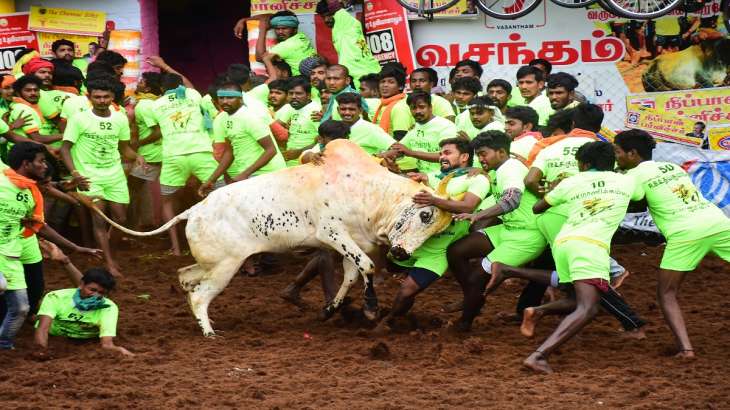
Jallikattu Supreme Court: The Supreme Court, hearing a petition challenging a Tamil Nadu law allowing Jallikattu, today (December 1) asked the state government how the sport of bull-taming is necessary for the conservation of the indigenous breed of bulls.
Jallikattu, also known as ‘Eruthazhuvuthal’, is a bull-taming sport played as part of the Pongal harvest festival in Tamil Nadu. A five-judge constitution bench headed by Justice KM Joseph also asked the state whether an animal can be used for entertainment of humans like Jallikattu.
Senior advocate Kapil Sibal, appearing for Tamil Nadu, told the top court that Jallikattu is not for entertainment and the person who exhibits his bull shows great care and kindness to the animal.
The bench, also comprising Ajay Rastogi, Aniruddha Bose, Hrishikesh Roy and CT Ravikumar, asked whether animals, for which “compassion” is considered as a constitutional value, should be subjected in such a manner for the entertainment of humans And can states allow it based on their notion of cultural rights.
Sibal said, “What is the basis of saying that this is pure entertainment? Look at it from a historical perspective.”
“What does he get from it?” asked the bench. The senior advocate replied that the price of the bull increases in the market.
When Sibal said that sports is not about entertainment, the bench retorted, “Not entertainment? Then why are people gathering there?” He replied, reasoning that it is to demonstrate the power of the bull, how you have tamed it and also how strong it is.
Sibal insisted, “The whole concept is that it is for entertainment, it is not like that at all.” The top court in its 2014 judgment had said that bulls cannot be used as performance animals for “Jallikattu” events or bullock cart races and banned their use for these purposes across the country .
It had earlier dismissed the Tamil Nadu government’s plea seeking review of its 2014 decision to ban the use of bulls for Jallikattu in the state and bullock cart races across India. Tamil Nadu had amended the central law—the Prevention of Cruelty to Animals Act, 1960—and allowed “Jallikattu” in the southern state.
Some of the petitioners had argued before the apex court that when the law prohibits cruelty to animals, there cannot be an amending Act which perpetuates cruelty. During the day-long hearing on Thursday, the bench asked, “The controversy is as to how conducting Jallikattu is necessary for the preservation of the indigenous breed.”
It has been argued on behalf of the petitioners that whatever prohibitions are in place to prevent cruelty are not being followed at the implementation level.
“And indeed, we have to lay down certain principles that if a law contains several preventive measures, but if in real life it is found that these are grossly violated, then it would be open to the court to These prohibitions are not enforceable and the Act is inherently draconian,” the bench said. The apex court, which also asked whether animals have personality, observed that one of the petitioners’ lawyers has argued that every animal is entitled to dignity.
“Dignity in what sense?” Sibal asked.
Stating that life is finite, Justice Joseph said, “As long as you are alive, in whatever form you are living in this world, you are entitled to be treated with dignity.
Also free from all kinds of physical pain, mental pain and fear”.
The bench said that one cannot say that he will use an animal as a plaything or a toy. Sibal said that it is everyone’s duty to protect nature in all its forms. The bench also sought to know about the evidence supporting the claim that it is a cultural practice.
The senior advocate argued that the petitioners have argued that the amended law is a “colorful exercise” of power as it perpetuates cruelty but it is a presumption.
He said that the new system seeks to prevent any kind of brutality and it cannot be a colorful exercise. Sibal said that there are many sports in which a person gets injured or even killed.
“What do you say about the noise effect (during ‘Jallikattu’)?” the bench asked. Sibal said that in marriage ceremonies this is done with the horse around which the band is tied. The hearing remained inconclusive and will continue on 6 December.
On November 24, a constitution bench began hearing petitions challenging Tamil Nadu and Maharashtra laws allowing “Jallikattu” and bullock cart races.
The Tamil Nadu government recently told the apex court that “Jallikattu” is a religious and cultural festival that has “religious significance” for the people of the state and does not violate the provisions of the Prevention of Cruelty to Animals (PCA) Act. 1960.
In a written submission filed in the apex court, the state said that “Jallikattu” is not just an act of entertainment or fun, but an event with great historical, cultural and religious value.
It added, “Jallikattu not only preserves the cultural and traditional heritage, but the continuous holding of these events also solves the problem of conservation of an indigenous breed of cattle.”
The apex court is considering five questions referred by a two-judge bench of the apex court in February 2018.
Referring the matter to a five-judge bench, the top court had said that the petitions challenging the Prevention of Cruelty to Animals (Tamil Nadu Amendment) Act, 2017 needed to be decided by a larger bench as Contains substantial questions related to interpretation. Constitution.
(With PTI inputs)
Read also: Tamil Nadu: One killed, 80 injured in ‘Jallikattu’ competition